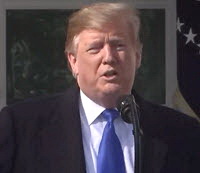A $333 billion spending package passed by Congress yesterday and signed by President Trump today funds the government through Sept. 30 (end of FY2019), avoiding a second government shutdown. (Senate Appropriations Committee summary, Feb. 15)
 |
President Trump today declared a national emergency over illegal immigration at the border. White House officials said executive powers will be used to reprogram $6.6 billion in Pentagon and Treasury funds to build a border wall. |
President Trump said he expected a legal battle over the emergency proclamation. “I expect to be sued. I shouldn’t be sued,” he said today. “We will possibly get a bad ruling. And then we’ll get another bad ruling. And then we’ll end up in the Supreme Court, and hopefully we’ll get a fair shake,” he added. (Wall Street Journal, Feb. 15)
An IRS hearing this week focused on how Opportunity Zone regulatory guidance may affect long-term investments in certain low-income communities. The hearing, originally scheduled for Jan. 10, was rescheduled due to the government shutdown in December.
 |
An IRS hearing this week focused on how Opportunity Zone regulatory guidance may affect long-term investments in certain low-income communities. |
 |
Sen. Tim Scott (R-SC) led the effort in Congress for enactment of the Opportunity Zones program. |
Similar issues were raised by 23 witnesses at the five-hour IRS hearing on Thursday. (Bisnow, Feb. 14).
The highly-anticipated, second set of Treasury OZ regulations are expected in the coming weeks. Another public hearing will follow before rules for the program are finalized.